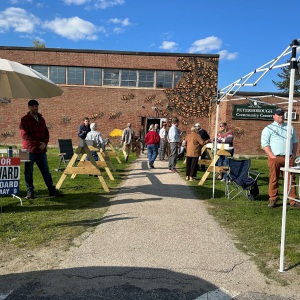BUSINESS QUARTERLY: Lack of housing in the state leaving people with few options
| Published: 04-25-2023 12:38 PM |
In Peterborough, the vacancy rate is 0.0 percent. Town Planner Danica Melone said in a healthy market, that number should be closer to 5 or 6 percent.
When Melone occasionally sees rentals pop up, they’re usually rented within a day. She said she has had all types of businesses reach out to her who have said it’s impacting their ability to find and retain staff.
“Even the hospital has called and said they’ve had great candidate doctors, but they can’t find a house that works for them,” said Melone.
And older people who are ready to downsize aren’t moving out of their larger homes because rentals are so competitive, there’s a lack of housing for senior citizens and retirement communities are expensive.
In 2017, most New Hampshire municipalities, including Peterborough, voted to amend their zoning ordinances to allow for accessory dwelling units (ADUs) in areas that are zoned for single-family houses. ADUs are in or attached to a single-family home and provide a living space for one person or more.
Melone said some residents were concerned this could double the population of Peterborough.
“It really didn’t,” Melone said. She said there are probably only about a dozen registered ADUs in town right now.
“Low- and moderate-income housing is allowed in very few districts,” said Melone. It’s not permitted in the Family District, but is permitted in the Commercial District, which Melone said isn’t practical.
Article continues after...
Yesterday's Most Read Articles
 Jaffrey hosts inaugural Monadnock Comic-Con
Jaffrey hosts inaugural Monadnock Comic-Con
 Christopher Stultz of Antrim sentenced to 18 months for false statements
Christopher Stultz of Antrim sentenced to 18 months for false statements
 Meet the candidates in this year’s Peterborough town election
Meet the candidates in this year’s Peterborough town election
 Mary Lawler remembered for a life of service
Mary Lawler remembered for a life of service
 Monadnock Paper Mills hires Chloe Jones
Monadnock Paper Mills hires Chloe Jones
 Fair builds a sense of community
Fair builds a sense of community
The Family District does allow for workforce housing, which has an average rent of $1,653 per month for a three-person household. Melone said through estimating local jobs’ salaries, “that is too high of a level for what we know [employees] are making.”
New Hampshire Finance Authority reported that the state will need 90,000 additional housing units between 2020 and 2040 to meet demand. The New Hampshire Emergency Rental Assistance program, which provided assistance to renters who were struggling to pay rent and utilities during the pandemic, was put on pause in October of 2022 after it was announced that the state would stop receiving federal funding on Dec. 29, 2022.
Kathleen Johnson, a Realtor with North New England Real Estate Group, said, “nobody’s moving” out of apartments because “there’s no place to go.” She’s seeing more people who need to find roommates to cover rent, and people who would have otherwise been buying houses are staying in rentals because they can’t afford the inflated cost of buying a home.
Some people are moving back in with parents and Johnson said elderly people are struggling with increasing rents when they’re on a fixed income. Plus it’s hard to find vacant first-floor apartments.
When apartments do become available, people are up against a lot of competition. Johnson said they need really good credit, landlords are looking for their income to be three times the rent, they need references and people trying to find apartments with pets can’t compete with applicants without pets, which is leading to more pets being surrendered.
“[Landlords] are being very picky,” said Johnson. “I don’t think you’re going to see two-bedroom apartments for $1,000 ever again.”
Johnson said New Hampshire is a popular place to move, and she is working with people looking for homes who are coming from Texas, Georgia and the West Coast.
“People are still moving here, still paying way over and are doing it fast,” she said, and for a house less than $400,000, “It’s going that day.”
Businesses like Millipore Sigma and Teleflex are expanding but workers can’t find housing. Johnson said some companies were putting new hires up in hotels and now multiple businesses are building their own housing.
Linda Smith, housing manager for RA Philbrick Elderly Housing and Greenfield Commons – subsidized housing run by Southern New Hampshire Services (SNHS) -- said, “There’s so much homelessness.” A couple months ago, they had to close the waitlist of over 80 people for their Greenville units, which include 70 units for people 62 and older and people who are young and disabled.
Residents pay 30 percent of their adjusted income (annual income minus medical expenses). Smith said most people are paying high $200s or low $300s per month.
Smith has a resident turning 100 this year who is still living alone. She said a challenging part of being in Greenville is the rural location, and residents without cars have trouble getting to places like the grocery store and have to rely on family and friends.
“A lot of residents kind of help each other out,” Smith said.
The Greenville community has a bus that was used to take people to the grocery store, but it is not currently running because they can’t find a volunteer driver. Also, the bus is 13 years old and on its last legs so they’ll have to look for a new one soon.
SNHS also provides commodity foods for people who fit the income guidelines, and people living in their subsidized housing don’t pay for heat or electricity.
Jennifer MacNeil, property manager at SK Management, which owns the subsidized developments of Woodland Heights in Peterborough and Gilmore Court in Jaffrey, said, “We are always 100 percent full” and “we always have a waiting list.”
Woodland Heights has a two- to three-year wait, and Gilmore Court has a one- to two-year wait. MacNeil said waits are long at most of the properties they manage in the state, and in Hampton she said people are waiting five to six years for a unit.

 PHOTOS: The Farm at Wolf Pine Hollow holds TulipFête 2024
PHOTOS: The Farm at Wolf Pine Hollow holds TulipFête 2024 Spellers strut their stuff at inaugural Greenfield Spelling Bee
Spellers strut their stuff at inaugural Greenfield Spelling Bee
